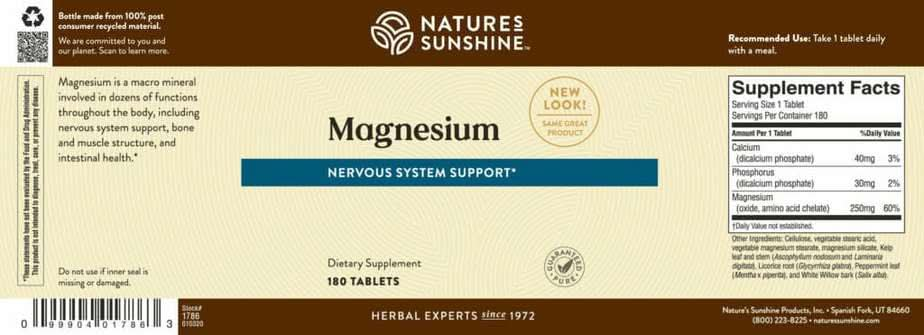The Herbs Place
Magnesium - 250 mg.
Magnesium - 250 mg.
Couldn't load pickup availability
Magnesium is often called the anti-stress mineral because it has a calming effect when taken. Its soothing properties induce restful sleep. It is very much needed by the person who has a hyperactive nervous system, or one who is hot-tempered, overly active, or agitated.
Magnesium is part of bones and cells, especially the smooth cells of arteries. It protects the arterial lining from stress caused by sudden blood pressure changes. Magnesium assists in the absorption of calcium and potassium.
Over 300 enzymes need magnesium to function properly. It has also been called the circulatory mineral because of its regulating effect on muscle contraction. Magnesium helps the body to utilize vitamins B6, C, and E.
When combined with B6 it helps to reduce and dissolve calcium phosphate stones. Magnesium is so important that the brain stores twice as much magnesium as other body tissues - this is a "safety supply" to have in the event of a drop in the magnesium reserves.
Magnesium combats acids, toxins, gases, and impurities in the body. It makes tissues limber, elastic, youthful, and supple. It is a natural laxative for the bowels.
Nature's Sunshine Advantage
This magnesium formula has co-factors to help assimilation of the magnesium.
Possible Signs of Deficiency
Angina, Asthma, Cardiac Arrhythmia, Chronic Fatigue, Chronic Pain Syndrome, Constipation, Depression, Dizziness, Digestive Problems, Heart Attacks (without magnesium, arteries tense up) High Blood Pressure, High LDL Cholesterol Levels, Hypertension, Insomnia, Irritability, Irritable Bowel Syndrome, Kidney Stones, Lack of Concentration, Migraines, Muscle Weakness, Nervousness, PMS Symptoms, Pulmonary Disorders, Rapid Heartbeat, Seizures, Spasmodic Pains (especially during women's monthly cycle), Sugar Cravings, Tantrums, Teeth Grinding, Twitching, Schizophrenia
Things That Increase the Body's Need for Magnesium
Alcohol, Antibiotics, Diuretics, Diarrhea, Fluoride, Excess Levels of Zinc and Vitamin D
Things That Deplete Magnesium
Large amounts of protein, fats, cod liver oil, calcium, and/or vitamin D. Foods high is oxalic acid, such as almonds, chard, cocoa, rhubarb, spinach, and tea. Stress, refined flour and sugar, chemotherapy.
Foods and Herbs High in Magnesium
Alfalfa, Apples, Apricots, Avocados, Bananas, Black-eyed Peas, Blackstrap molasses, Brown Rice, Cantaloupe, Catnip, Capsicum, Chamomile, Chickweed, Dandelion, Dulse, Eyebright, Figs, Garlic, Grapefruit, Green leafy veggies, Hops, Horsetail, Kelp, Lemons, Licorice, Lima Beans, Mullein, Nuts, Parsley, Peaches, Soybeans, Tofu, Whole Grains
Ingredients per Tablet
Calcium (di-calcium phosphate) 40 mg
Phosphorus (di-calcium phosphate) 30 mg
Magnesium (amino acid chelate, magnesium oxide, magnesium stearate) 250 mg
In a base of Kelp plant (Macrocystis pyrifera), Licorice root (Glycyrrhiza glabra), Peppermint leaves (Mentha piperita), and White Willow bark (Salix alba).
Recommended Use
Take one tablet daily with a meal.
Cautions
Individuals with severe heart disease should take magnesium only on the advice of their physician.
Customer Comments Severe Menstrual Cramps - "I had severe cramps and used 4 MAGNESIUM with the herbal base and 6 CHAMOMILE. I did the same in an hour and was fine till morning when I did the same and had the same results." Marie




